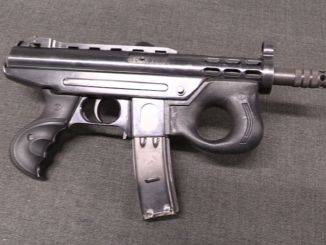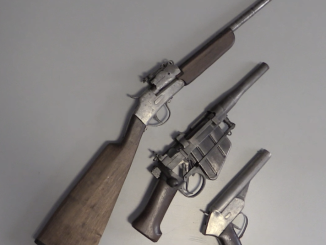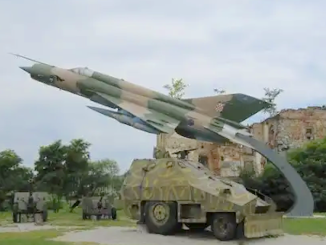SKM was a small industrial manufacturing company in Croatia that began making submachine guns in 1991 to equip Croatian fighters in the Homeland War. Their product was the M91 Crogar, which is a selective-fire, open bolt SMG chambered for 7.62mm Tokarev. It uses the magazine from the Yugoslav M56 SMG, along with its rotating bolt handle feature as a safety mechanism. The bolt and recoil spring are based on the MP40, and a folding stock inspired by the side-folding AKs made in Poland, Romania, and Hungary. Total production quantity is not known, but was not more than a few hundred at most. The build quality on these guns was quite good, and they were reportedly well liked by those who got them.
A big thanks to the Croatian Police Museum (Muzej Policije) in Zagreb for giving me access to film this rare piece for you! Check them out at: https://muzej-policije.gov.hr




“Crogar(…)”
According to https://www.mojatvrtka.net/s-k-m-d-o-o/ S.K.M. d.o.o. is located in town named Garešnica https://hr.wikipedia.org/wiki/Gare%C5%A1nica so this might be source of 3 last letters.
You are on right track, check Pleter m91, from Pleternica town.
Difference between them, Pleter reached serial production in thousands, like Zagi or Šokac.
That’s a really interesting point you have brought up —- I wonder if Ian will be able at some point to review those weapons you mentioned ( unless I missed something along the way ).
True, they mostly havent been reviewed so far (Šokac was!), in 10 or so years of FW.
But online they are not unknown and forgotten, lots of info and pictures. Some of them were even sold as demilled parts kits in US.
Actually the stock and particularly the stock plate seems very Beretta M12, while the bolt is borrowed from Automat M56, along with the magazine – hence the M56 safety cocking handle. The MP40-style save for the lacking firing pin seems almost like the Portuguese FBP m/948 or 963. The front sight base and “shoulder thing that goes up” (or a mere barrel shroud to the uninitiated) are really true folk art. Never allow a bored craftsman near your SMG project, or that’s what you get
I’m getting sick of the “shoulder thing that goes up” meme. It just goes to show that most actors, politicians, and news casters tend to do a bad job of researching technical data. Leave the technical stuff for the actual experts.
Yes. Or those who have played countless hours of first person shooter games and know their weapons.
Video games hardly count as measures of expertise. Lots of guys can play those games yet not be able to manhandle a single shot .22LR bolt-action rifle in real life.
Agreed. The number of technically incorrect assumptions and descriptions bandied around by the so-called experts and authorities in the media on both sides is reflective of the sheer ignorance and lack of knowledge that prevails. How can one expect to have any credibility whatsoever if one cannot even get the basic facts right, regardless of one’s status or platform? If anyone is going to publicly present an evaluation or report concerning any aspect of firearms and the history thereof, he/she clearly needs to be absolutely on top of the facts, and not be presenting perceptions as hard truth. Otherwise, any little potential credibility, such as there is, will go straight out the window.
the MP40 style save for lacking firing pin RETURN SPRING, of course.
correction: the MP40 style save for lacking firing pin RETURN SPRING, of course.
Awesome Ian, thank you again for doing what you do. Stuff like this is so great. Why did they manufacture them in two different calibers? Any idea why they they didn’t just do 9mm?
On a historical/political note… I think Ian’s statement at about the 0.29 point of the video, where he says “…in 1990 democracy came to Croatia with the breakup of Yugoslavia.” might meet with some objections from victims of the wars surrounding the breakup of the nation formerly known as Yugoslavia. There was “democracy” in Yugoslavia, in varying degrees after WWII, for a given value thereof.
Some might even argue that the breakup of Yugoslavia was precipitated by rather too much democracy…
The former Yugoslavia is a mystery to most Americans. We know very little about it, to the point where I found myself explaining things I knew from growing up around the expat community here in the US to people who had been State Department employees in Yugoslavia when that whole thing lit up back around the early 1990s. Which was, to say the least, a bizarre experience… I found myself asking, sotto voice, “Aren’t you people supposed to be the experts, here…?”
Stories I could tell. At least one fairly senior individual that was doing the briefing had zero idea that there was a history in Bosnia that went back further than the post-WWII era, and expressed confusion that the Turks had ever been that far north in the Balkans.
Dude had a humanities degree from a prestigious American university, as well. It very obviously wasn’t in Balkan history…
“Sotto Voce” —- If what you experienced concerning the State Department employees is correct, that would be a source of utmost concern regarding our foreign policy and how it is determined. No amount of certified education from even the most prestigious universities in the world is a guarantee of truly consistent and accurate situational awareness, with all the ramifications this implies.
That the rest of the world thinks that Americans are dumb and believe that there be dragons and they fall over the edge of the world outside CONUS once again supported. *sigh* 🙁
Well kay, you cannot know all of history of all of the world, but a humanities degree should make a person able to do research. When assigned to the Balkans he could read up on it. That is what humanities students are supposedly doing at university. And this really is a failure on the part of the State Department guy, that supposedly was to be an expert on the Balkans. Also a failure on thevpart of the State Department hierarchy not caring if he actually knows anything.
Quite so. Rather unfortunate to say the least, and certainly cause for concern.
Many of these appointments are more for political allegiance rather than skill AFAIK. And it is not like you could not get this knowledge in the USA. I am sure there are a few university professors for esoteric history of far away countries that would be happy to share their expertise with some newly appointed bureaucrats.
The US of A are not alone in this today. Remember the very short term prime minister Liz Truss, who was a dud. German minister of the foreign ACAB has made a “feminist foreign policy” her criterium for candidates in her ministry. So it is not only the USA, that puts the right smell above all else. And this in these times of reshuffling the global balance. Interesting times are ahead with these leaders.
I think you have certainly hit the nail on the head, so to speak. Unfortunately, it is the ordinary people of all countries involved in these politically-motivated decisions who nearly always end up paying the price for said decisions, regardless of whether they were ignorant or aware of the processes and motivations involved, due to a whole host of factors such as social momentum, peer pressure, fear, coercion and so on. Such is human nature, and the societal mores that have evolved to haunt us.
Let me bring up a water hose, to clear up this unfortunate dreck written above;
First, there never was a “nation of Yugoslavia”; it was on paper federated union of 6 republics, hosting 8 different nations (two had no republic, one proto-nation – “muslims” from bosnia and herzegovina, after 1992. called “Bosniaks”, and Albanians in Kosovo, which was a Serbian based autonomous province. There was also autonomous province of Vojvodina, both were annexed directly by Serbia in 1990.),
also 3 religions and 2 scripts. Quite a mix!
Second, it was a single party political system in all of Yugoslavia (Union of communists), with no private ownership of real estate and economy. State/party controlled everything, and any dissenter got jailed or even murdered. State underground police was so notorious that they continued to dilligently carry on foreign assassinations even 7,8 years after Tito died, up until late 80s.
You wanna know whats hilarious? Their bloody handed agents and operatives got a direct new job(s) in post 1990. democratic transition – makes one wonder (rhetorical question) isnt it partly orchestrated by communist party who sensed the Iron Curtain fall, and rushed to be in all the new institutions.
Third, victims of the 1990s war had absolutely nothing to do with democracy or non-democracy or any other political affiliation – they were killed primarily based on their nationality.
Interesting… So, Slobodan Milosevic wasn’t elected President of the Serbian Republic the way he’s universally described as? He was appointed, or something…?
Milošević rose to power in 1987 by promoting populist and nationalist views, arguing for the reduction of power of Serbia’s autonomous provinces and increased centralism.[1][2][3] He was elected president of Socialist Republic of Serbia in 1989 and led the anti-bureaucratic revolution, after which he reformed Serbia’s constitution by transitioning Serbia to a multi-party system, and reduced the power of autonomous provinces. Following the 1990 general elections, Milošević enacted dominant-party rule while his party retained control over key economic resources of the state.”
That’s the Wikepedia description of it, and the way nearly every non-Serbian apologist understands it. What transpired after his election was a direct outgrowth of his election, where he received 80% of the votes. Granted, it wasn’t a multi-party election, and one of his stooges was running alongside him, but there were alternatives to be had, and most Serbs I remember talking to thought he was the best candidate… And, most of them were entirely on-board with what happened afterwards.
So, to say that there was “no democracy” in the former Yugoslavia is a bit inaccurate. Much of the turmoil happened precisely because the various non-Serbian republics voted in separatist politicians, and the Serbs didn’t like that one damn bit. The fact that the various irredentist factions of Serbian politics were agitating for even more Serbian power over the smaller republics didn’t help one damn bit, either.
I stand by my comments. There were democratic elections in the former Yugoslavia before 1990, and a lot of what happened was precisely because the “wrong people” won those elections, from the Serbian nationalist point of view.
Never mind that a lot of those candidates won because the voters in those republics had been scared silly by the things the Serbian politicians were doing and saying…
Whole thing was a huge mess, and not helped one damn bit by the outside money and influence coming in from around the globe. Germans doing things in Slovenia and Croatia; Saudi money coming into Bosnia, all of that. Nearly everyone was complicit in encouraging the disaster that was the 1990s, but in the end? The people of the former Yugoslavia are the ones that decided to pull the trigger on dissolving the Federal Republic, nobody else. That they did so largely in fear of Serbian irredentism? Thank the idiots that thought to use that in order to gain power. None of it was necessary, and everyone is worse off because of it.
There wasnt any significant german capital in Croatia ans Slovenia, on the contrary, they specifically didnt send as little as 1 round as military help, chickened out big time. I agree on the dissolution fault, though there were several european countries that didnt help, or pretended helping, but actually stirred s..t with their interests and machinations.
Yugoslavia, being economically accustumed to levitation between 2 blocks, was instantly doomed to failure when one block dissolved, because of all the rooted corruption, its quasi-communist establishment that sucked the foreign money, and economy that wasnt competitive any more (more like for 15 years before even) on any global scale.
The West could have prevented the separation of Yugoslavia, but only if they pumped huge amount of funds, and apparently in 1990. was nobody that crazy, anymore- why would they? Its not like they needed an ally against big bad soviets and warsaw pact.
It could have happened peacefully, but some eastern republics had an idea of quasi manifest destiny, and seized an opportunity, basicly last ever in recent history, of trying to expand their territories at expense of other republics and nations. The new policy of clean slate and not being able to parasite on more wealthier western republics anymore, like when all being part of federation, certainly was also a motivation to attack and steal by force.